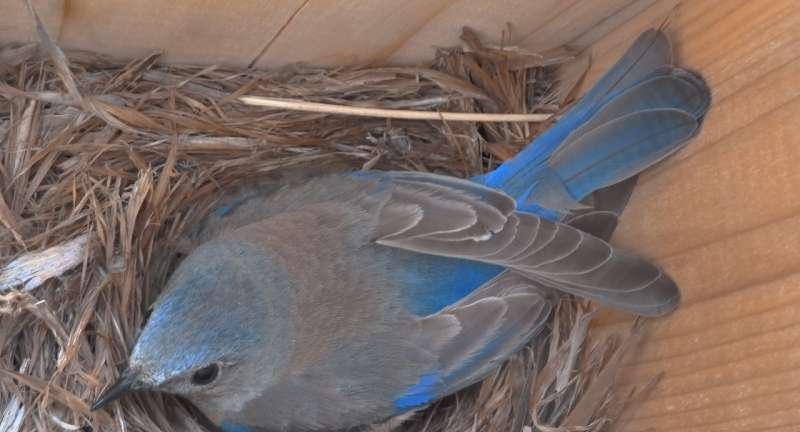
Above: This west blue plover guards its eggs in a nest box in a natural gas field. Because compressor noise makes it unable to discern whether its environment is safe or not, it must choose between guarding its nest and going out of the nest to find food for the chicks. Source: Nathan Kleist
In a study published this week in the Proceedings of the National Academy of Sciences (PNAS), a team led by Nathan Kleist experimented and found that three species of adult and chicks exhibited multiple symptoms of chronic stress caused by noise, mainly abnormal levels of stress hormones. Noise can also affect the health of the chicks.
The researchers selected three species of birds, western bluebirds, mountain bluebirds and ash-throated flycatchers. 240 nest boxes are set up at different distances from the source of the noise (gas compressors), and birds nest in these nest boxes. The researchers examined the stress response of nesting birds by measuring the level of the stress hormone cortisol within a certain noise gradient.
The results showed that birds in a constantly noisy environment exhibited symptoms very similar to those in patients with PTSD. The louder the noise, the lower the corticosterone base levels in adult and chicks of the three species. Low corticosterone may be a sign of intense stress, and the body has lowered the baseline level of hormones as a means of self-preservation.
When testing the chicks' response to sudden threats, corticosterone spiked compared to typical high stress levels and fell back slowly to baseline levels. This symptom is also similar to the symptoms that have previously occurred in chronic stress on humans and rodents.
In addition, the noise also affects the health of the chicks. In the noisiest environments, chicks become smaller and their feathers develop less, which may reduce their chances of survival. The hatching rate of even the most noise-resistant west blue plover is reduced by noise. Guralnick believes that the constant noise may act as an "acoustic blanket," eliminating sound cues from birds detecting predators, competitors, and all-species species. Unable to tell if her environment is safe, the mother bird must choose between guarding the nest and finding food for the chicks. And always in a state of stress, which can eventually have a series of effects on physical health and wellness. All in all, the noise reduces the animals' habitat, directly affects their health, and ultimately affects their numbers.
Co-author Clinton Francis argues that hearing is a universal surveillance system for vertebrates, including humans, and that hearing may be evolutionarily conservative, so the study's conclusions may hold true in humans as well.
This work is important for protecting both wildlife and human health.
Compilation: Yi Xian Editor: Zhang Meng
Source: https://phys.org